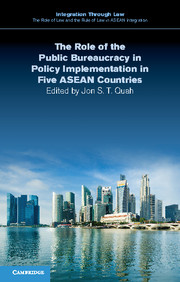Book contents
- Frontmatter
- Contents
- List of tables
- List of contributors
- General editors’ preface
- Preface
- 1 The role of the public bureaucracy in policy implementation in five ASEAN countries: a comparative overview
- 2 Weak central authority and fragmented bureaucracy: a study of policy implementation in Indonesia
- 3 The public bureaucracy's role in policy implementation in Malaysia
- 4 Dysfunctional bureaucracy, corruption and weak rule of law: a case study of policy implementation in the Philippines
- 5 Governance and meritocracy: a study of policy implementation in Singapore
- 6 Vietnam's public bureaucracy and implementation of two ASEAN policies
- 7 Policy implementation in ASEAN and the European Union: the problem of asymmetric compliance
- Executive summary
- Index
Executive summary
Published online by Cambridge University Press: 05 February 2016
- Frontmatter
- Contents
- List of tables
- List of contributors
- General editors’ preface
- Preface
- 1 The role of the public bureaucracy in policy implementation in five ASEAN countries: a comparative overview
- 2 Weak central authority and fragmented bureaucracy: a study of policy implementation in Indonesia
- 3 The public bureaucracy's role in policy implementation in Malaysia
- 4 Dysfunctional bureaucracy, corruption and weak rule of law: a case study of policy implementation in the Philippines
- 5 Governance and meritocracy: a study of policy implementation in Singapore
- 6 Vietnam's public bureaucracy and implementation of two ASEAN policies
- 7 Policy implementation in ASEAN and the European Union: the problem of asymmetric compliance
- Executive summary
- Index
Summary
The public bureaucracy is a key institution in the Association of Southeast Asian Nations (ASEAN) countries because it is usually the largest employer and is also responsible for the implementation of public policies. How effective are the public bureaucracies in the ASEAN countries in policy implementation? This book focuses on the public bureaucracies’ role in policy implementation in Indonesia, Malaysia, the Philippines, Singapore and Vietnam. Its purpose is twofold: (1) to analyse the role of the public bureaucracies in policy implementation in these five countries; and (2) to compare and explain their different levels of effectiveness.
There is great diversity in the policy contexts of the five ASEAN countries. First, the size of these countries in terms of land area and population ranging from the smallest (the city state of Singapore) to the largest (the world's largest archipelago of Indonesia) are two important aspects which influence greatly the public bureaucracy's effectiveness in policy implementation. Second, the colonial legacy is another significant factor as the legacy of former British colonies like Singapore and Malaysia appears to be more positive than the colonial legacies of the Dutch for Indonesia, the Spanish and United States for the Philippines, and the French for Vietnam. Third, there is a wide disparity in GDP per capita between Singapore's GDP per capita of US$54,776 in 2013, and the other four ASEAN countries, with Vietnam having the lowest GDP per capita of US$1,902 for the same year. Finally, except for Vietnam, which is a communist state, the other four countries have democratic political systems: Indonesia and the Philippines are presidential democracies, Malaysia is a constitutional monarchy and Singapore is a parliamentary democracy. The most important factor for effective policy implementation is perhaps the political will or commitment of both the incumbent government and the implementers. Thus, the policy contexts of the five ASEAN countries have a tremendous impact on their public bureaucracies’ role in policy implementation, as a favourable policy context will enhance their role while an unfavourable policy context will undermine it.
To ensure consistency and enhance comparative analysis, Van Meter and Van Horn's model of policy implementation involving these six variables is adopted in the five country chapters, namely the ‘economic, social and political conditions’ (or policy context), clarity of the policy standards and objectives; their communication to the implementers; availability of policy resources; effectiveness of the implementing agencies; and disposition of the implementers.
- Type
- Chapter
- Information
- Publisher: Cambridge University PressPrint publication year: 2016

